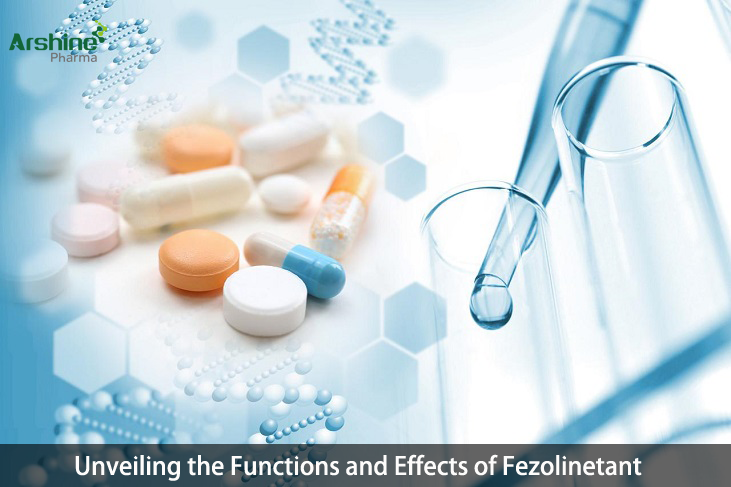
Fezolinetant, a novel compound, has emerged as a promising option in the realm of women's health, particularly in addressing symptoms associated with menopause. Recognized for its selective antagonism of neurokinin-3 (NK3) receptors, fezolinetant has garnered attention for its potential to alleviate vasomotor symptoms, such as hot flashes and night sweats, providing a new approach to enhance the quality of life for menopausal women. Delving into the multifaceted functions and effects of fezolinetant involves exploring its mechanism of action, therapeutic applications, and considerations in clinical use.
Introduction to Fezolinetant
Fezolinetant belongs to a class of drugs known as neurokinin receptor antagonists, specifically targeting the NK3 receptor. Neurokinin receptors are part of the tachykinin family of G protein-coupled receptors and play a role in the regulation of various physiological processes, including the modulation of neurotransmitter release. The selective antagonism of NK3 receptors by fezolinetant has positioned it as a potential breakthrough in managing vasomotor symptoms associated with menopause.
Mechanism of Action
The neurokinin family includes three major receptors: NK1, NK2, and NK3. Fezolinetant's specific target is the NK3 receptor, which is expressed in the central nervous system, including areas involved in thermoregulation. By selectively antagonizing the NK3 receptor, fezolinetant modulates the activity of neurokinin B, a neuropeptide associated with the regulation of body temperature and the occurrence of vasomotor symptoms.
Functions and Effects
1. Alleviation of Vasomotor Symptoms
The primary function of fezolinetant is to alleviate vasomotor symptoms, such as hot flashes and night sweats, that are commonly experienced by women during and after menopause. Vasomotor symptoms are attributed to hormonal fluctuations, particularly changes in estrogen levels. Fezolinetant, by targeting the neurokinin system, offers a unique approach to modulating the neural pathways involved in thermoregulation, leading to a reduction in the frequency and severity of vasomotor symptoms.
2. Impact on Hypothalamic-Pituitary-Gonadal Axis
The hypothalamic-pituitary-gonadal (HPG) axis plays a central role in regulating reproductive hormones, including estrogen. Fezolinetant's action on the NK3 receptor is thought to influence the HPG axis, leading to a downstream effect on hormonal regulation. This modulation contributes to its efficacy in mitigating vasomotor symptoms associated with hormonal fluctuations during menopause.
3. Quality of Life Improvement
Beyond its physiological effects, fezolinetant has the potential to significantly improve the quality of life for menopausal women. Vasomotor symptoms can be disruptive and impact daily activities, sleep, and overall well-being. By providing relief from these symptoms, fezolinetant aims to enhance the overall quality of life during the menopausal transition and beyond.
Therapeutic Applications
1. Menopausal Vasomotor Symptoms
The primary therapeutic application of fezolinetant lies in the management of vasomotor symptoms associated with menopause. Hot flashes and night sweats are prevalent during this transitional period, affecting a substantial number of women. Fezolinetant's targeted action on the neurokinin system makes it a promising option for those seeking relief from these bothersome symptoms.
2. Alternative to Hormone Replacement Therapy
For women who either cannot or prefer not to undergo hormone replacement therapy (HRT) to manage menopausal symptoms, fezolinetant presents an alternative approach. HRT, while effective in alleviating symptoms, is associated with certain risks and contraindications. Fezolinetant offers a non-hormonal option, addressing vasomotor symptoms through a distinct mechanism without affecting estrogen levels.
3. Individualized Treatment
The therapeutic landscape for menopausal symptom management is evolving towards more personalized and tailored approaches. Fezolinetant, with its unique mechanism of action, may find a place in individualized treatment plans, allowing healthcare providers to consider patient-specific factors, preferences, and medical histories when addressing vasomotor symptoms.
Effects and Considerations in Clinical Use
1. Efficacy in Clinical Trials
Clinical trials have demonstrated the efficacy of fezolinetant in reducing the frequency and severity of vasomotor symptoms. Phase 2 and Phase 3 trials have reported significant improvements in symptom scores compared to placebo, indicating the potential of fezolinetant as an effective and well-tolerated treatment option.
2. Safety Profile
The safety profile of fezolinetant is an essential consideration in its clinical use. While specific safety data may vary based on ongoing research and regulatory assessments, early indications suggest that fezolinetant is generally well-tolerated. Common adverse effects reported in clinical trials include mild gastrointestinal symptoms, such as nausea.
3. Impact on Bone Health and Cardiovascular System
One notable advantage of fezolinetant as a non-hormonal option is its potential to avoid certain risks associated with estrogen-based therapies. Unlike estrogen-based treatments, fezolinetant is not expected to impact bone health or cardiovascular parameters, making it a potentially safer option for women with specific health concerns or contraindications to estrogen therapy.
4. Long-Term Use Considerations
As with any long-term therapy, the safety and tolerability of fezolinetant over extended periods are crucial considerations. Long-term studies are needed to assess the sustained efficacy and safety of fezolinetant, particularly in terms of its impact on bone health, cardiovascular outcomes, and other relevant parameters.
Conclusion
Fezolinetant represents a promising advancement in the field of menopausal symptom management. Its selective antagonism of the NK3 receptor provides a novel approach to addressing vasomotor symptoms without the need for hormonal interventions. As research continues to unfold the nuanced functions and effects of fezolinetant, its role in individualized treatment plans and its potential to improve the quality of life for menopausal women become increasingly evident.
The introduction of fezolinetant as a non-hormonal option adds diversity to the available therapeutic strategies for menopausal symptom management. Its targeted mechanism, efficacy in clinical trials, and favorable safety profile position it as a valuable addition to the evolving landscape of women's health. As healthcare providers continue to explore the best approaches for each patient, fezolinetant stands as a beacon of progress in the quest to enhance the well-being of women experiencing the challenges of menopause.
